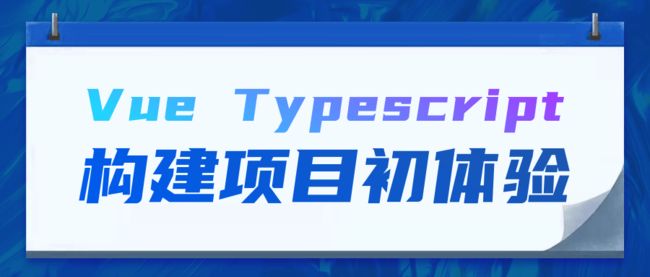如何用Vue+TypeScript项目配置实战?本文教你
❝最近想学习一下TypeScript语法,但是只是看官方文档又有些乏味,还是通过项目在实践中学习比较有趣,所以在这里记录一下我的学习历程,与Vue项目结合开发。(官方文档 请戳 >>)
❞
项目搭建
通过脚手架搭建
1. 通过Vue CLI 3 创建vue项目
vue create vue-typescript// 在此选择typescript支持
? Check the features needed for your project: () Babel () TypeScript ( ) Progressive Web App (PWA) Support () Router () Vuex >() CSS Pre-processors () Linter / Formatter ( ) Unit Testing ( ) E2E Testing 我是08年出道的高级前端架构师,有问题或者交流经验可以进我的扣扣裙 519293536 我都会尽力帮大家哦
复制代码// 引入 vue-class-component 插件 // 以下大概是我的选择 ? Use class-style component syntax? (Y/n) y ? Use Babel alongside TypeScript (required for modern mode, auto-detected polyfills, transpiling JSX)? Yes ? Use history mode for router? (Requires proper server setup for index fallback in production) Yes ? Pick a CSS pre-processor (PostCSS, Autoprefixer and CSS Modules are supported by default): Sass/SCSS (with node-sass) ? Pick a linter / formatter config: Prettier ? Pick additional lint features: Lint on save ? Where do you prefer placing config for Babel, ESLint, etc.? In dedicated config files ? Save this as a preset for future projects? (y/N) n
复制代码
2. 启动项目
yarn run serve
复制代码能跑起来吗,能跑就是好项目
3.项目配置
此时其实脚手架已经帮我们配置好了大多数的配置,但还是需要熟悉一下配置。
tsconfig.json
在项目根目录下创建tsconfig.json。
{
// 编译选项
"compilerOptions": {
// 输出目录
"outDir": "./output",
// 是否包含可以用于 debug 的 sourceMap
"sourceMap": true,
// 以严格模式解析
"strict": true,
// 采用的模块系统
"module": "esnext",
// 如何处理模块
"moduleResolution": "node",
// 编译输出目标 ES 版本
"target": "es5",
// 允许从没有设置默认导出的模块中默认导入
"allowSyntheticDefaultImports": true,
// 将每个文件作为单独的模块
"isolatedModules": false,
// 启用装饰器
"experimentalDecorators": true,
// 启用设计类型元数据(用于反射)
"emitDecoratorMetadata": true,
// 在表达式和声明上有隐含的any类型时报错
"noImplicitAny": false,
// 不是函数的所有返回路径都有返回值时报错。
"noImplicitReturns": true,
// 从 tslib 导入外部帮助库: 比如__extends,__rest等
"importHelpers": true,
// 编译过程中打印文件名
"listFiles": true,
// 移除注释
"removeComments": true,
"suppressImplicitAnyIndexErrors": true,
// 允许编译javascript文件
"allowJs": true,
// 解析非相对模块名的基准目录
"baseUrl": "./",
// 指定特殊模块的路径
"paths": {
"jquery": [
"node_modules/jquery/dist/jquery"
]
},
// 编译过程中需要引入的库文件的列表
"lib": [
"dom",
"es2015",
"es2015.promise"
]
}
}
复制代码tslint.json
在根路径下创建tslint.json文件,就是 引入 ts 的 standard 规范。
如果已经引入了eslint的配置文件,这一步其实也可以不做。
{
"extends": "tslint-config-standard",
"globals": {
"require": true
}
}
复制代码附上一个脚手架自动生成的eslint的默认配置 eslintrc.js。
module.exports = {
root: true,
env: {
node: true
},
extends: [
"plugin:vue/essential",
"eslint:recommended",
"@vue/typescript/recommended",
"@vue/prettier",
"@vue/prettier/@typescript-eslint"
],
parserOptions: {
ecmaVersion: 2020
},
rules: {
"no-console": process.env.NODE_ENV === "production" ? "warn" : "off",
"no-debugger": process.env.NODE_ENV === "production" ? "warn" : "off"
}
};
复制代码4.支持ES6 / ES7
在 tsconfig.json中,添加对es6 / es7的支持,更多的配置请见tsconfig - 编译选项。
"lib": [
"dom",
"es5",
"es6",
"es7",
"es2015.promise"
]
复制代码5.配置Vuex
首先当然是先安装依赖啦。
yarn add vuex vuex-class
复制代码- vuex:在
vue中集中管理应用状态 - vuex-class :在
vue-class-component写法中 绑定vuex。
引用了vuex-class之后还是和原来的写法有点儿区别的。
vuex store 中该怎么写,还怎么写,引用的时候如下:
import { Component, Prop, Vue } from "vue-property-decorator";
import { State, Getter, Action, Mutation, namespace } from "vuex-class";
// 声明使用的是哪个模块
const commonModule = namespace("common");
@Component
export default class HelloWorld extends Vue {
@Prop() private msg!: string;
// 获取vuex中的数据
@commonModule.State("token") token!: string;
@commonModule.Getter("getToken") getToken!: string;
@commonModule.Action("setToken") actionSetToken: (arg0: string) => void;
@commonModule.Mutation("setToken") mutationSetToken: unknown;
// @State token
// @Getter("token") getterToken;
// @Action("token") actionToken;
// @Mutation("token") mutationToken;
created() {
this.actionSetToken("123");
alert(this.token);
}
}
复制代码6.支持 vue mixin 函数
在src下新建mixins目录,根据业务复用模块划分结构。
在使用Vue进行开发时我们经常要用到混合,结合TypeScript之后一般有两种mixins的方法。
一种是vue-property-decorator提供的
// 定义 routerMixins.ts文件
// mixin router 公共方法
import Vue from 'vue'
import Component from 'vue-class-component'
@Component
export default class myMixins extends Vue {
/**
* @author: WangXinYu
* @describe: 浏览器后退事件
* @param: {}
* @return:
**/
goBack() {
this.$router.go(-1)
}
/**
* @author: WangXinYu
* @describe: test
* @param: {}
* @return:
**/
routerTest() {
console.log('are you ok?')
}
}
复制代码// 引入 mixin
import { Component, Prop, Vue, Mixins } from 'vue-property-decorator'
import routerMixins from '@/mixins/router'
@Component
export default class HelloWorld extends Mixins(routerMixins) {
created() {
this.routerTest()
}
}
复制代码第二种是在@Component中混入。
// mixins.ts
import { Vue, Component } from 'vue-property-decorator';
declare module 'vue/types/vue' {
interface Vue {
value: string;
}
}
@Component
export default class myMixins extends Vue {
value: string = 'Hello'
}
复制代码// 混入
import { Vue, Component, Prop } from 'vue-property-decorator';
import myMixins from '@/mixins/myMixins';
@Component({
mixins: [myMixins]
})
export default class myComponent extends Vue{
created(){
console.log(this.value) // => Hello
}
}都会了吗?如果不懂 ,记住我 。我是08年出道的高级前端架构师,有问题或者交流经验可以进我的扣扣裙 519293536 我都会尽力帮大家哦
本文的文字及图片来源于网络加上自己的想法,仅供学习、交流使用,不具有任何商业用途,版权归原作者所有,如有问题请及时联系我们以作处理
